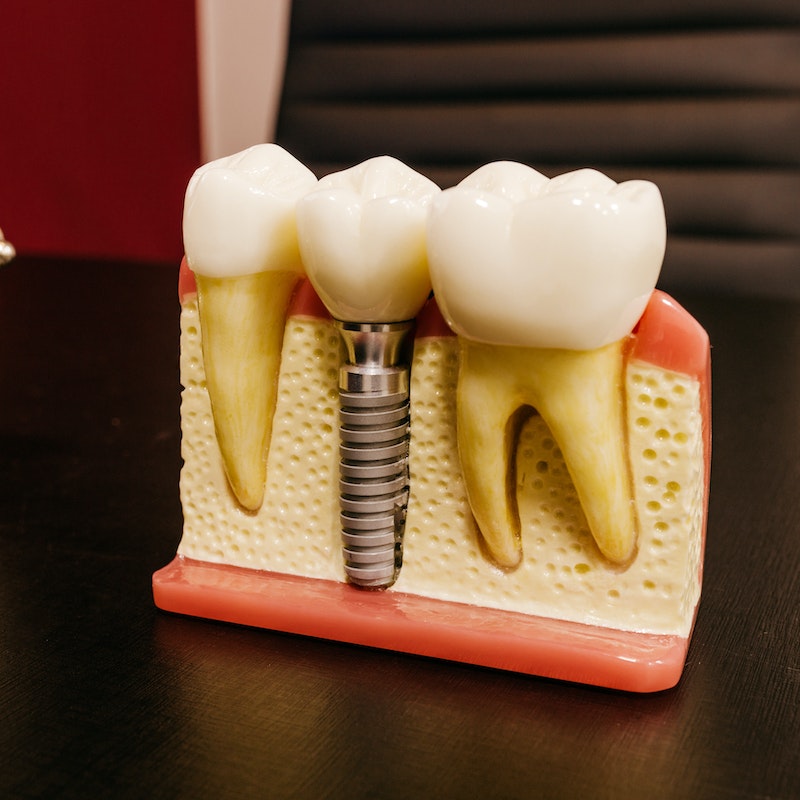Sep
19

Getting a dental implant can be an exciting process – albeit one that comes with certain inconveniences. While you can look forward to a gleaming, healthy new tooth, you do need to make sure that you respect certain restraints during the healing and recovery process, most notably when it comes to food.
So, what can you eat after a dental implant? In the following article, we’re going to take a look at what foods to avoid, and give you 9 examples of post-surgery-friendly foods that you can snack on until the recovery process is over. Let’s dive in!
Foods to Avoid After a Dental Implant
After a dental implant, it’s fundamental to know that certain foods pose a risk to the healing and recovery process – especially hard foods and substances that might cling to your teeth and gums. Here are some foods to avoid for the first few weeks:
- Crunchy Foods: Tempting as they might be, foods such as nuts, chips, and hard sweets can exert undue pressure on the fresh implant, possibly leading to micro-damage or extended recovery periods.
- Sticky Foods: Items like caramel or gummy bears run the risk of dislodging or affecting the implant, so avoid them entirely during the healing process.
- Spicy and Very Hot Foods: Spicy foods can cause irritation to the surgical area, complicating the healing process, so avoid hot curries and mexican takeout during your healing period.
- Dairy: Milk and other dairy products can increase the risk of infections due to the bacteria contained in them.
You Might Also Like: How Long Does the Dental Implant Procedure Take?
9 Foods You Can Eat After a Dental Implant Surgery
So, what can you eat after your dental implant surgery? Here are some safe – and tasty – options any dentist in London would recommend:
Yoghurt
A delightful blend of taste and health, yoghurt is easy on your fresh implant, and absolutely safe to eat during the healing process. Not only is it safe on the teeth, it’s also rich in protein and calcium – but make sure to opt for plain or gentle flavours to ensure minimal irritation while enjoying this creamy treat.
Apple Puree
A naturally sweet treat, apple puree provides a soft texture that’s kind to your surgical site, so feel free to snack on these as often as you like during your recovery down-time. Packed with essential vitamins, apple puree (and other fruit purees) provide a nutritious, effortless eating experience, ensuring you won’t irritate your gums or teeth during your recovery.
Mashed Potatoes
The epitome of comfort food, mashed potatoes can be both delicious and gentle on your implant – and you can dress them up however you choose! Enhance the flavour of creamy mash with a dab of butter, a splash of gravy, or even a sprinkle of cheese; mashed tatties aren’t just satisfying for your palette, but also ensure your implant area remains stress-free.
Smoothies
From vibrant fruits to nutritious vegetables, you can’t go wrong with yummy smoothies. Opt for a blend of fruits, perhaps some protein-rich Greek yoghurt, and ensure you get both taste and nutrients in every sip, without the need for chewing.
Soups
Warm, nourishing soups, especially when finely blended, can be a source of immense comfort post-surgery. Ranging from the classic tomato soup to more intricate options like cream of chicken or minestrone, soups cater to both your taste buds and your healing gums.
Porridge
A breakfast staple, porridge is both soft and nutritious, and whether you prefer it made with water, milk, or even a dairy-free alternative, porridge offers a flexible palate that can be enhanced with a drizzle of honey or a handful of soft fruits. Just remember that you shouldn’t add any hard or crunchy elements that you might usually include, like nuts or granola – keep these for after the recovery period.
Scrambled Eggs
Delicately cooked scrambled eggs can be the ideal food choice post dental implant surgery; not only are they soft and easy to consume, but eggs also bring with them a host of nutritional benefits, including essential proteins that can aid in the healing process. For a twist, consider adding some finely grated cheese or soft herbs, ensuring both flavour and gentleness.
Cottage Cheese
Cottage cheese, with its soft texture and mild flavour, is another excellent choice for those recovering from dental surgery. Packed with proteins and calcium, cottage cheese can be eaten on its own, mixed with soft fruits, or even spread on lightly toasted bread once you’re comfortable with slightly firmer foods. Its versatility ensures that you can incorporate it into various meals throughout your recovery – or go ahead and eat it straight from the tub!
Hummus
Originating from the Middle East but cherished worldwide, hummus is a creamy, smooth dip made primarily from chickpeas, and its soft consistency makes it perfect for post-operative dental care. Rich in proteins, healthy fats, and a range of vitamins and minerals, hummus can be paired with soft pita bread or used as a spread. Its diverse flavour profiles, from classic to roasted red pepper or garlic, also mean that you don’t have to compromise on taste during your recovery.
How long after dental implants can I eat normally?
The timeframe for resuming normal eating patterns varies depending on individual healing processes and the complexity of the surgery. Generally, patients are advised to stick to a soft food diet for the first 10-14 days post-surgery. However, it’s essential to understand that the full integration of the implant into the jawbone, a process called osseointegration, can take several months.
During this period, even as you reintroduce harder foods into your diet, it’s crucial to approach them with caution. Biting directly onto hard foods with the implant site before it has fully healed can jeopardise the success of the procedure.










